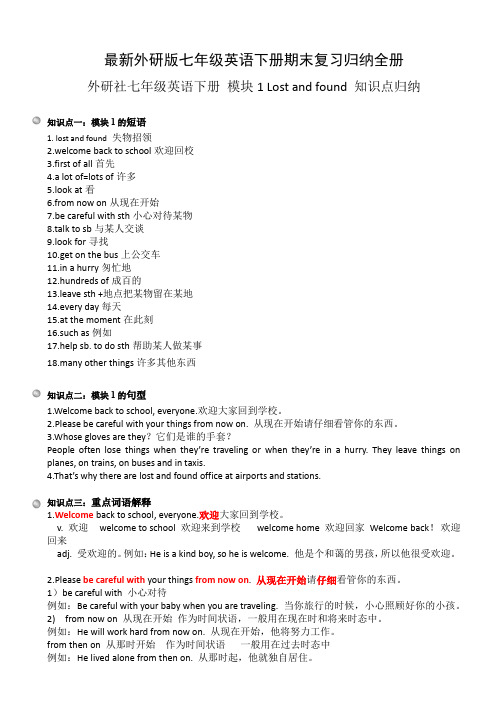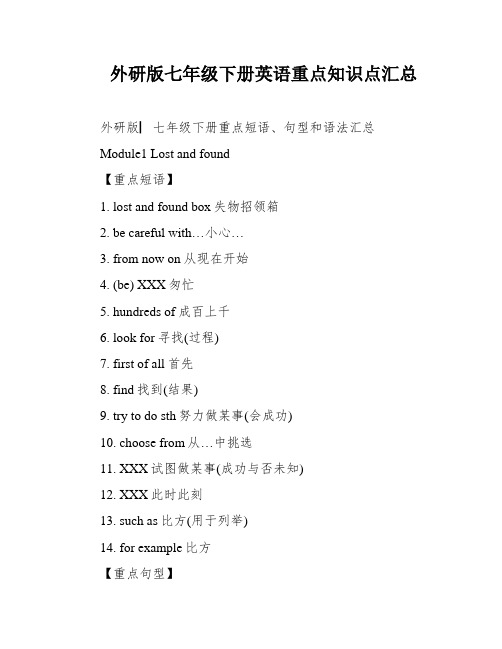(完整word版)外研版七年级下册英语语法复习
(完整版)外研版七年级下册英语语法专题复习(含练习).docx

YOUWIN Education 优胜教育初中英语内部资料外研版|七年级下册重点知识点梳理法知点1.:物主代、情can 和方位介短2.:一般将来和一般去3.句型:特殊疑句、祈使句、感句和疑句词类1)物主代:表示所属关系的代(⋯属于的)数复数人称形容性物主代名性物主代形容性物主代名性物主代第一人称my mine our ours第二人称your yours your yourshis his第三人称her hers their Theirsits its形容性物主代和名性物主代的关系:形容性物主代:必和名在一起。
My father, your teacher...物主代名性物主代 :相当于与之相的形容性物主代+名。
This shirt is mine. =This is my shirt.(1)。
()1. Look at.A. himB. heC. his()2. I drive to the park every day.A. theyB. theirC. them()3.classroom is big.A. weB. usC. Our()4. I love.A. sheB. herC. hers()5. Do you know?()6. I am son.A. theyB. theirC. them()7. This is not _____ desk.. My desk is over there.A. IB. myC. me()8. -Can you spell _____ name, Harry? -Sorry.A. youB. yourC. yours()9. Tom and Jack are brothers. This is _____ room.A. theyB. themC. their()10. We are in the same class. _____ classroom is very nice.A. ourB. myC. ours()11. Mrs. Green is my teacher. I’m _____ student.A. heB. hisC. him()12. That ’s a cat. _____ name is Mimi.A. ItB. It ’ sC. Its( 2)用括号里的代的适当形式填空1, Mr Yang is _______(we) teacher.________(him) is from Beijing. _______(his)teaches______(our) English.2, Look,there is a cat._______(they) is Lily's.____(it) name is Mimi.3, Let______(I) tell ______(she) about_____(he) life at school.4, This is ______(they) room.Where is _____(our)?5, Don't use the eraser.______ is ______(me).6, The lady under the tree is ______(me) aunt._____(her) often sings with_____(she) husband2)情 can1.含:表达人或物的能力,能或会⋯2.特点:情can 没有人称和数的化,之后要加原形。
(完整版)外研版七年级英语下册知识点归纳及练习

MODULE1一、词汇。
1. listen 听(强调动作)hear 听见(强调结果)I listened carefully but I heard nothing. 我仔细听但什么也没听到2.on a (school) trip3. have a good time = enjoy oneself4. take pictures = take photos5. lie in the sun躺在阳光下lie on the beach 躺在沙滩上躺下【动】She is lying on her back. 她正仰卧着。
位于【动】London lies on the River Thames 伦敦位于泰晤士河畔说谎【动】You are lying to him! 你在对他说谎。
eg: Look! The boy ________on the bed and reading a book.A. is lyingB. lyingC. liesD. lie6. send sb. a postcard 寄给某人一张明信片send sth. to sb. = send sb. sth.7. anyway 无论如何(转移话题)8. buy some presents 买礼物buy sth. for sb. = buy sb. sth.9. enjoy sth. 喜欢某物enjoy oneself = have a good/ great time 玩的开心enjoy/ like doing sth. 喜欢做某事10. at this moment=now 此时此刻(现在进行时)11. leave work 下班be at work 上班He is at work. = He is working12. wait for buses 等公共汽车run for trains 赶乘火车(地铁)13. have afternoon tea 喝下午茶14. watch a ballet 看芭蕾see friends 看望朋友get dressed = dress oneself 穿衣;打扮eg: The boy can’t dress himself.15. call home 给家里打电话call sb. = give sb. a call= phone sb.二、语法。
(新外研版)七年级英语下册(全册)语法知识点大全(共73页)

(新外研版)七年级英语下册(全册)语法知识点大全(共73页)Module 1 Lost and found语法精选1. whose 谁的whose意为“谁的”,是表示所有关系的疑问词。
其用法如下:(1)可以用来对名词所有格或形容词性物主代词进行提问。
如:This is Tina’s/her hat.→Whose hat is this?(2)可以用来对名词性物主代词进行提问。
如:These pencils are mine.→Whose are these pencils?2. hundred与hundreds ofhundred是一个确数,表示“一百”;hundreds of是一个概数,表示“好几百的;许许多多的”。
当 hundred前面有一个具体的数词时,hundred不变为复数。
如:①two hundred cows两百头奶牛②Hundreds of people come here ev ery day.每天都有许多人到这里来。
注意:当hundred与of连用时,它后面的名词和它本身都用复数。
如:hundreds of cows 几百头奶牛3. such as 比如;例如such as意为“比如;例如”,用于引出多个例子。
如:I like some animals such as lions and monkeys. 我喜欢一些动物,比如狮子和猴子。
注意:for example也意为“比如;例如”,用来举例说明某一论点或情况,一般只举同类人或物中的“一个”为例,作插入语,可位于句首、句中或句末。
如:①For example, air is invisible.例如,空气是看不见的。
②He, for example, is a good student.例如,他就是个好学生。
③Many boys like playing basketball. Take me, for example.许多男孩喜欢打篮球。
最新外研版七年级英语下册期末复习归纳全册

最新外研版七年级英语下册期末复习归纳全册外研社七年级英语下册模块1 Lost and found 知识点归纳知识点一:模块1的短语1. lost and found失物招领2.welcome back to school欢迎回校3.first of all首先4.a lot of=lots of许多5.look at看6.from now on从现在开始7.be careful with sth小心对待某物8.talk to sb与某人交谈9.look for寻找10.get on the bus上公交车11.in a hurry匆忙地12.hundreds of成百的13.leave sth +地点把某物留在某地14.every day每天15.at the moment在此刻16.such as例如17.help sb. to do sth帮助某人做某事18.many other things许多其他东西知识点二:模块1的句型1.Welcome back to school, everyone.欢迎大家回到学校。
2.Please be careful with your things from now on. 从现在开始请仔细看管你的东西。
3.Whose gloves are they?它们是谁的手套?People often lose things when they’re traveling or when they’re in a hurry. They leave things on planes, on trains, on buses and in taxis.4.That’s why there are lost and found office at airports and stations.知识点三:重点词语解释1.Welcome back to school, everyone.欢迎大家回到学校。
外研版七年级下册英语重点知识点汇总

外研版七年级下册英语重点知识点汇总外研版▏七年级下册重点短语、句型和语法汇总Module1 Lost and found【重点短语】1. lost and found box失物招领箱2. be careful with…小心…3. from now on从现在开始4. (be) XXX匆忙5. hundreds of成百上千6. look for寻找(过程)7. first of all首先8. find找到(结果)9. try to do sth努力做某事(会成功)10. choose from从…中挑选11. XXX试图做某事(成功与否未知)12. XXX此时此刻13. such as比方(用于列举)14. for example比方【重点句型】1. XXX ?这是谁的…?2. help sb do XXX.XXX或人做某事3. XXX…请谨慎保管…4. Welcome to +地点欢迎来到…5. call sb at +德律风号码拨…给或人打德律风【语法总结】物主代词:透露表现所属干系的代词(…属于谁的) 单数描述词性物主代词myyourhisherits复数描述性物主代名词性物主代词词XXXyoursyourhisXXXits人称第一人称第二人称第三人称名词性物主代词oursyoursXXX形容词性物主代词:必须和名词在一起,例如XXX, your XXX...名词性物主代词:相当于与之相对应的形容词性物主代词+名词,例如XXX.Module2 What can you do?【重点短语】1. get on well with sb.与或人相处和谐2. play the piano弹钢琴3. play table XXX打乒乓球4. what about…?=how about…? ...若何?5. XXX…担心…6. be good at doing XXX.擅长做某事7. fly a kite放风筝8. that’s all仅此而已9. be ready to do sth.乐于做某事【重点句型】1.XXX?做…怎么样?2.Would like to do sth.愿意做某事3.promise to do sth.答应做某事4.play +球类名词玩…球5.play the +乐器吹奏…乐器6.do (some) +动词ing方式做…7.be XXX.确信…(语言人的信心)8.be sure to do sth.肯定…(语言人的猜测) 【语法总结】情态动词can的用法1.含义:表达人或物的能力,能或会.2.特点:情态动词can没有人称和数的变化,之后要加动词原形。
外研版七下英语语法总结(一)

外研版七下英语语法总结(一)外研版七下英语语法总结前言介绍外研版七下英语语法是中学英语教材中的一部分,适用于七年级学生学习英语语法知识。
本文将对这一教材进行总结,旨在帮助学生更好地掌握相关知识。
学习重点•名词的单复数形式•人称代词的主格和宾格形式•数词的基数词和序数词形式•形容词的比较级和最高级形式•动词的时态和语态•常见的冠词和不定代词正文名词的单复数形式•名词的单数和复数形式有规律可循,如加-s和-es,或者变化整个词形等。
•需要注意的是,有些名词的复数形式是不规则的,需要特别记忆。
人称代词的主格和宾格形式•人称代词根据在句中的不同作用,分为主格和宾格形式。
•主格用于作主语,宾格用于作宾语或补语。
数词的基数词和序数词形式•基数词用来表示具体的数目,如one, two, ten等。
•序数词用来表示顺序,如first, second, tenth等。
形容词的比较级和最高级形式•形容词有比较级和最高级两种形式,用于描述事物的程度。
•通过在形容词后面加-er和-est,或者在前面加more和most来构成比较级和最高级。
动词的时态和语态•动词根据时间的不同,可以分为一般现在时、一般过去时和一般将来时等时态。
•动词的语态包括主动语态和被动语态,用于描述动作的执行者和承受者。
常见的冠词和不定代词•冠词包括定冠词和不定冠词,用于限定名词的范围。
•不定代词用来代替不确定的人或物,如somebody, anybody, something等。
结尾外研版七下英语语法是学生学习英语语法的重要教材之一。
通过对名词、人称代词、数词、形容词、动词和冠词等知识点的学习,学生可以更好地理解和运用英语语法规则。
希望本文的总结对学生的学习有所帮助。
word完整版)新外研版七年级英语下册各单元语法总复习练习及答案
word完整版)新外研版七年级英语下册各单元语法总复习练习及答案Module 1语法:名词性物主代词在英语中,人称代词和物主代词是非常重要的。
人称代词分为第一人称、第二人称和第三人称。
物主代词分为形容词性物主代词和名词性物主代词。
一、选择填空1.这些是钢笔,那些是铅笔。
(that。
this。
those)2.XXX昨天病了。
这就是他缺席学校的原因。
(That,Those。
These)3.这些衬衫中哪些是XXX的?(These。
this。
that)4.这张桌子是我的,那张是她的。
(those。
this。
that)5.北京的地图比天津的地图好。
(this。
that。
these)6.他的名字是XXX。
她是一名厨师。
(He。
Her。
His) (She。
He。
His)7.我的姑妈是一名护士。
她工作非常努力。
(I,My,XXX) (She。
He。
Her)8.请给我指路。
(me。
I。
XXX)9.这些书不是我的。
它们可能是她的。
(my。
XXX。
I) (They。
It。
Its) (her。
hers。
your)10.让我告诉她如何做。
(I。
me。
mine) (her。
she。
hers)二、选择填空1.每个人都应该尽力而为。
(its。
ones。
his。
their)2.她是我的好朋友。
(She。
mine) (Her。
mine) (She。
my) (Hers。
my)1.What can you do。
I can lift this box。
but I can't lift that heavy chair.2.Can he read Chinese?——No。
he can't read Chinese。
but he can read.3.Can you stand in front of the door。
Then I can see you.4.Did XXX dishes。
Yes。
she did.5.I can see some spoons。
(完整word)外研版七年级下册英语语法专题复习(含练习)
外研版|七年级下册重点知识点梳理1)物主代词:表示所属关系的代词(…属于谁的)形容词性物主代词和名词性物主代词的关系:形容词性物主代词:必须和名词在一起。
My father, your teacher... 物主代词名词性物主代词:相当于与之相对应的形容词性物主代词+名词。
This shirt is mine. =This is my shirt.练习(1)选择题。
()1. Look at .A. himB. heC. his()2. I drive to the park every day.A. theyB. theirC. them()3. classroom is big.A. weB. usC. Our()4. I love .A. sheB. herC. hers()5. Do you know ?A. IB. myC. me()6. I am son.A. theyB. theirC. them()7. This is not _____ desk.. My desk is over there.A. IB. myC. me()8. -Can you spell _____ name, Harry? -Sorry.A. youB. yourC. yours()9. Tom and Jack are brothers. This is _____ room.A. theyB. themC. their()10. We are in the same class. _____ classroom is very nice.A. ourB. myC. ours()11. Mrs. Green is my teacher. I’m _____ student.A. heB. hisC. him()12. That’s a cat. _____ name is Mimi.A. ItB. It’sC. Its(2)用括号里的代词的适当形式填空1, Mr Yang is _______(we) teacher.________(him) is from Beijing. _______(his) teaches______(our) English.2, Look,there is a cat._______(they) is Lily's.____(it) name is Mimi.3, Let______(I) tell ______(she) about_____(he) life at school.4, This is ______(they) room.Where is _____(our)?5, Don't use the eraser.______ is ______(me).6, The lady under the tree is ______(me) aunt._____(her) often sings with_____(she) husband2)情态动词can1.含义:表达人或物的能力,能或会…2.特点:情态动词can没有人称和数的变化,之后要加动词原形。
(完整word版)外研社七年级英语下册Module10-A-holiday-journey知识点复习
MODULE 10 A Holiday Journey1.短语:2.go there 到那里3.enjoy…a lot 非常喜欢… a lot 很, 非常4.drive sb.to…开车送某人去…5.go back to our family home 回到我们家到达: arrive 不及物动词, 接here ,there, home等地点副词时省略介词。
arrive in+大地点arrive in Chinaarrive at +小地点arrive at the schoolarrive homeget 不及物动词get to +地点接地点副词时, 省略toreach 及物动词reach+地点6.the day before yesterday 前天the day after yesterday 后天7.at the airport 在机场8.works of art 艺术作品9.such as 例如10.have dinner 吃晚饭11.take a walk 散步=go for a walk12.street market 街头市场13.do some shopping 购物14.buy…for sb.为…买…15.hope 希望没有hope sb to do sth 这一结构hope to do 希望做…hope +句子16.have to do...不得不做17.wait in line排队等候cut in line 插队18. a special holiday 一个特殊的假期19.Pacific Ocean 太平洋20.on holiday 度假on sale 出售on duty 在值日on leave 在休假on fire 着火21.at the station 在车站22.do different things 做不同的事情23.all day一整天= the whole day24.take lots of photos 照许多照片25.at the top of 在…顶端how long 表示“多久, 多长时间”, 用来提问时间的长短, 常用“for+一段时间”或“since+时间点/一段时间+ago”或“since+从句”作答。
(完整版)外研版七年级下册全部语法内容大汇总
外研版七年级下册全部语法内容大汇总一. 情态动词can的用法can+动词原形,它不随主语的人称和数而变化。
1. 含有can的肯定句:主语+can+谓语动词的原形+其他。
2. 含有can的否定句:主语+can't+动词的原形+其他。
3. 变一般疑问句时,把can提前:Can+主语+动词原形+其他?肯定回答:Yes,主语+can。
否定回答:No,主语+can't.4. 含有can的特殊疑问句:特殊疑问词+can+主语+动词原形+其他?I can speak English.→I can't speak English.→Can you speak English? →What can you speak?二. what time和when引导的特殊疑问句1. 询问钟点时用what time,询问日期、月份、年份时用when。
2. What's the time?=What time is it?现在几点了?3. 时刻表达法:顺读法和逆读法。
顺读法:“钟点+分钟”直接读数字。
如:7: 05 seven five;8:16 eight sixteen逆读法:借助介词past或to表示,要先说分再说钟点。
a. 当分钟不超过30分钟时(包括30分钟),即<或=30,用past表示。
其结构为:“分钟+past+整点”意为“几点过几分”。
如:1:25 twenty-five past oneb. 当超过30分钟时,即>30,用to表示。
其结构为:“所差分钟(即60—所过分钟数)+to+下一个整点”,to译成“差”,差几分钟到几点。
如:4:38 twenty-two to fivec. 当分钟为30分钟用half表示,当分钟为15分钟用a quarter。
三. how引导的特殊疑问句1. how 引导的特殊疑问句提问交通方式,其答语分三种情况:a. take a/an/the+交通工具(单数)b. by+交通工具(单数)c. on/in+限定词+交通工具---How do you go to school every day?---I take a bus to go to school every day./I go to school by bus every day./I go to school on t he bus every day.2. how far 用来提问距离,多远,其答语分为两种:(1)用长度单位表示:It is five kilometers.(2)用时间表示:It’s twenty minutes’walk.3. how long 用来提问时间,意为多久回答常用“for+段时”。
- 1、下载文档前请自行甄别文档内容的完整性,平台不提供额外的编辑、内容补充、找答案等附加服务。
- 2、"仅部分预览"的文档,不可在线预览部分如存在完整性等问题,可反馈申请退款(可完整预览的文档不适用该条件!)。
- 3、如文档侵犯您的权益,请联系客服反馈,我们会尽快为您处理(人工客服工作时间:9:00-18:30)。
下册重要知识点梳理词类1)物主代词:表示所属关系的代词(…属于谁的)形容词性物主代词和名词性物主代词的关系:形容词性物主代词:必须和名词在一起。
My father, your teacher... 物主代词名词性物主代词:相当于与之相对应的形容词性物主代词+名词。
This shirt is mine. =This is my shirt.练习(1)选择题。
()1. Look at .A. himB. heC. his()2. I drive to the park every day.A. theyB. theirC. them()3. classroom is big.A. weB. usC. Our()4. I love .A. sheB. herC. hers()5. Do you know ?A. IB. myC. me()6. I am son.A. theyB. theirC. them()7. This is not _____ desk.. My desk is over there.A. IB. myC. me()8. -Can you spell _____ name, Harry? -Sorry.A. youB. yourC. yours()9. Tom and Jack are brothers. This is _____ room.A. theyB. themC. their()10. We are in the same class. _____ classroom is very nice.A. ourB. myC. ours()11. Mrs. Green is my teacher. I’m _____ student.A. heB. hisC. him()12. That’s a cat. _____ name is Mimi.A. ItB. It’sC. Its(2)用括号里的代词的适当形式填空1, Mr Yang is _______(we) teacher.________(him) is from Beijing. _______(his) teaches______(our) English.2, Look,there is a cat._______(they) is Lily's.____(it) name is Mimi.3, Let______(I) tell ______(she) about_____(he) life at school.4, This is ______(they) room.Where is _____(our)?5, Don't use the eraser.______ is ______(me).6, The lady under the tree is ______(me) aunt._____(her) often sings with_____(she) husband2)情态动词can1.含义:表达人或物的能力,能或会…2.特点:情态动词can没有人称和数的变化,之后要加动词原形。
3.否定形式:cannot(正式用法)=can’t(口语)4.句型结构:肯定句:主语+ 情态动词+ 动词原形+ 其他+ 。
She / They can swim well.否定句:主语+ 情态动词+ not + 动词原形+ 其他+ 。
She / They can not swim well.一般疑问句:情态动词+ 主语+ 动词原形+ 其他+ ?Can she / they swim well?Yes, she / they can. / No, she / they can’t.特殊疑问句:疑问词+ 情态动词+ 主语+ 动词原形+ 其他+ ?Why can she / they swim well?Who can swim well?练习:( ) 1) The sign on the wall means you stay away from the building.A. mustB. can’tC. shouldn't( ) 2) How many books you see on the desk?A. mayB. canC. should( )3) --- you see the sign over there? --- Sorry, I can’t.A. CanB. Can’tC. Should4. I can run fast. I ________ ________ fast. (否定句)5. He can play basketball well. (一般疑问句)_______ he ______ basketball well?3)介词over在……between ...and ...在两者之间Lingling sits between Tony and Daming. 玲玲坐在托尼和大明之间among 在三者或三者以上之间Miss Li is among lots of students. 李老师在许多同学之间注意:介词短语常和be动词连用。
时态1)一般将来时时间状语:in+一段时间;tomorrow;in the future; next+时间;this+时间(表示将来时间的状语)﹙Ⅰ﹚be(is,am.are)going to 的用法。
含义:计划,打算做某事将来时句型结构:一般将来时be going to+动词原形肯定句结构:主语+be going to +动词原形+其他.否定句结构:主语+be not going to +动词原形+其他.一般疑问句:be动词提前Be +主语+going to +动词原形+其他?肯定回答:Yes,主语+be.否定回答:No,主语+be not.注意:①表示计划到某地去,谓语动词go与going重复,一般只说be going to +地点.②come/go/arrive/leave等表示位置转移的动词可用于现在进行表将来。
Eg:I am going to London next year.She is going to check her email.Look! The bus is coming.﹙Ⅱ﹚由shall和will引导的一般将来时含义:将会…特点:助动词shall和will没有人称和数的变化,之后要加动词原形。
shall在一般将来时中,一般用于第一人称之后。
例如:I/We shall have an English lesson.我们将有一节英语课。
否定形式:shall not=shan′t will not=won′t将来时句型结构:肯定句:主语+shall/will+do否定句:主语+shall/will+not+do(will not 可缩写成won’t)一般疑问句:shall/will+主语+ do特殊疑问句:疑问词+ shall/will+主语+do2)一般过去时1.一般过去时表示过去某个时间发生的动作或存在的状态,常和表示过去的时间状语连用。
一般过去时也表示过去经常或反复发生的动作。
2.标志性时间状语:yesterday(昨天), last week(上周), last month(上个月), last year(去年), two months ago(两个月前), the day before yesterday (前天),in 1990 (在1990年), in those days (在那些日子里)等表示过去的时间状语连用。
3.动词结构:V-ed动词过去式变化规则:1.一般在动词末尾加-ed,如:pull-pulled, cook-cooked2.结尾是e加d,如:taste-tasted3.末尾是辅音字母加一个元音字母和一个辅音字母的重读闭音节,应双写末尾的辅音字母,再加-ed,如:stop-stopped4.以“辅音字母+y”结尾的,变y为i,再加-ed,如:study-studied5.不规则动词过去式:lose(丢失) ----lostmake(制造) ----made mean(意思) ----meant meet(见) ----metpay(付) ----paidsay(说) ----saidsell(卖) ----sold send(送)----sentsit(坐) ----satsleep(睡) ----slept smell(嗅) ----smelt spell(拼写) ----spelt spend(度过) ----spent stand(站) ----stood teach(教) ----taught tell(告诉) ----toldwin(赢) ----wonthink(想) ----thoughtunderstand(理解) ----understood begin(开始) ----beganblow(吹) ----blewbreak(打破) ----brokechoose(选择) ----chosedo(做) ----diddraw(画) ----drewdrink(喝) ----drankdrive(驾驶) ----droveeat(吃) ----atefall(落下) ----fellfly(飞) ----flewforget(忘) ----forgotgive(给) ----gavego(去) ----wentgrow(成长) ----grewknow(知道) ----knewlie(躺) ----lay----lainring(按铃) ----rangwrite(写) ----wroteride(骑) ----rodesee(看见)----sawshow(出示) ----showed wake(弄醒) ----wokesing(唱) ----sangspeak(讲话) ----spoke steal(偷) ----stole wear(穿) ----woreswim(泳) ----swamtake(拿) ----tookthrow(扔) ----threw become(成为) ----became come(来) ----camerun(跑) ----ran4. 句式变化规则:Be动词在一般过去时中的变化:(1)am 和is在一般过去时中变为was。
(was not=wasn't)(2)are在一般过去时中变为were。
(were not=weren't)(3)带有was或were的句子,其否定、疑问的变化和is, am, are一样,即否定句在was或were后加not,一般疑问句把was或were调到句首。
